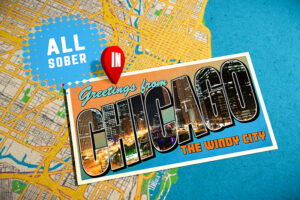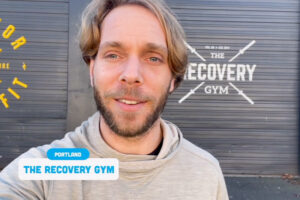Sleep Like a Champ and Level Up Your Recovery
We know you're busy, but bad sleep habits can hold you back in sober life — and hurt your health in the longer term. Here's why and how to sleep tighter

The human body, at the most basic level, asks you to do just three things to keep it alive: Eat, drink water and sleep. It’s not a huge ask — the body even makes them pleasurable! And yet. Many people neglect all these simple and vital physiological needs. Many more of us are guilty of slacking on one. Eating and drinking are usually scheduled into your day through lunch breaks, family dinners and, well, feeling hungry or thirsty, but sleep gets put on the back burner again and again.
“There isn’t enough time in the day” is a common refrain. Relying on coffee or energy drinks or plain old powering through, people have conditioned themselves to function on minimal sleep and have accepted this as normal, to the point of feeling guilty when they allow time for an actually-normal sleep schedule.
Cutting corners on sleep is an especially easy trap to fall into in recovery. As you adapt to new changes and lifestyles, many stressors can arise — not to mention the practical and emotional challenges you may confront, from the mundane to the existential. You’re making adjustments, repairs and improvements to your work situation, relationships and social life, plus trying to keep up with your recovery work: counseling, aftercare requirements, support group meetings. Who has the time?
But in recovery, taking care of yourself is nonnegotiable, and getting adequate sleep is part of that. You’ll need it to help you be the most on-point version of yourself, and you’ll be glad that version shows up for you in the recovery process.
What Are the Effects of Not Getting Enough Sleep?
Why is not getting enough sleep so bad? If you can function, go to work and complete necessary tasks, why isn’t it OK to live off six, five, four or even fewer hours of sleep each night?
The Centers for Disease Control and Prevention (CDC) recommends that adults should be getting at least seven hours of sleep each night. This is, for most people, the minimum amount of uninterrupted sleep needed to rest, reset the brain and wake up fresh, ready to tackle situations and stress that may come up. (It varies, of course. You may need eight hours in dreamland. Some of Major League Baseball’s biggest stars, like Justin Verlander and Shohei Ohtani, throw nine- or even 10-hour nights.) Sleep studies and research have found that even one night of “short sleep” can affect you the next day.
The CDC also reported that a third of adults in the U.S. aren’t getting that recommended amount of sleep each night. Studies have linked insufficient sleep with type 2 diabetes, heart disease, obesity and depression. Lack of sleep can also contribute to mistakes at work or, more dangerously, behind the wheel.
Bad sleep habits do you no favors in recovery and sober life. Lack of sleep, or poor sleep during the night, can depress your mood and make you feel less motivated or less productive, according to the CDC. Managing daily responsibilities without adequate sleep can cause setbacks and frustrations that impact recovery. You’ll likely find it harder to focus on what promotes sober living for you, and end up feeling even more stressed and overwhelmed — which is pretty unhelpful if you were slashing sleep to deal with stressful stuff in the first place.
Weekend Catch-Up Sleep Doesn’t Cut It
During the week, you may be so busy that your sleep suffers, and it’s tempting to see the weekend or your days off as a chance to catch up on missed sleep. It doesn’t work like that, though. Replacing sleep missed with extra rest on the weekends may even make it more difficult for your body to rebound. In any event, the science suggests it does little to protect against the health effects of poor sleep habits — those risks of hypertension, diabetes, heart disease, obesity and strained mental health.
Healthy Sleep Habits — and Benefits!
“Sleep hygiene,” as the experts call it, is “a set of behavioral and environmental recommendations intended to promote healthy sleep.” Healthy sleep allows your body to reset through rest while your brain goes through a series of important processes to set you up for success the next day. Quality sleep helps you think critically, maintain an even mood throughout the day, solve problems and have more positive interactions with others.
You don’t want to compromise these abilities in recovery. There’s enough on your plate as it is. Why take away the advantages to your well-being that a solid sleep will give you?
So: how to get better at going to bed? The CDC has a handy list of good sleep habits to help you get some rest. Basically:
- Be consistent. Go to bed at the same time each night.
- Design your bedroom for peace. Make your bedroom a haven for sleep: quiet, dark and comfortable.
- Eliminate electronics. No TV or phones in the bedroom at night! Or if that’s not an option, try to unplug yourself at least one hour before sleep.
- Avoid a full stomach. Avoid big meals and caffeine before bedtime.
- Exercise or stay active: Physical activity during the day can help tire you out and get you sleeping.
Sleep hygiene is important, but a good sleep can be hard to find, especially in early recovery and often for reasons out of your control. If you still have difficulty falling asleep, staying asleep or having a restful sleep, talk to a doctor to discuss options to help you sleep better. You’re doing a lot in recovery to feel your best again, and you’ve more than earned this much.
More Lifestyle
The Definitive Guide to Sober Travel
Vacations shouldn't be nerve-racking, but in recovery, it's not always that simple. We asked three sober travel pros how to make your trips fun — and more fulfilling than ever.
Sure-Bet Sober Date Ideas
Ready to get back out there? Sober dating isn't so hard. But here are a few pointers anyway, to help you find your groove.
Sobriety Roundtable: What's Your Favorite Sober Activity?
From roller derby to CrossFit and dog fostering to splurging on Mexican, nine sober folks shared what they do for fun and fulfillment. Get some ideas for your own Dry January or longer-term sobriety!
The Joy of Baking (Sober)
Two months sober, Annie Zimmerman decided to make cookies. Now, her hobby turned passion yields fulfillment, connection and delicious soberversary cakes. Read the interview!
Now Elite NFL Players, They First Tackled Addiction | News Roundup
All Sober compiles the best of the latest headlines. Here's your addiction and recovery news for the week of Feb. 19, 2024!
All Sober in Chicago
A great town for recovery, come sun, rain or snow! Check out our video guide to the Windy City's best sober options for bars, bottle shops — and even an arcade with vintage games.
All Sober in New York
The Big Apple truly has it all — including a sober bar with a "witchy vibe" and an array of enchanting non-alc cocktails. Take a peek in our video guide to the sober city!
All Sober in Portland
Oregon's cultural capital may be weird and proud, but it's sober and proud too! We scoped out the coolest sober-friendly spots in our new video guide.










